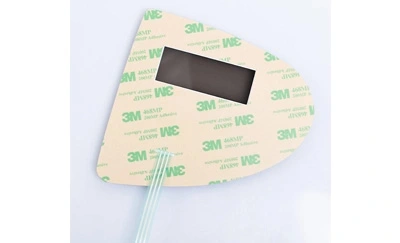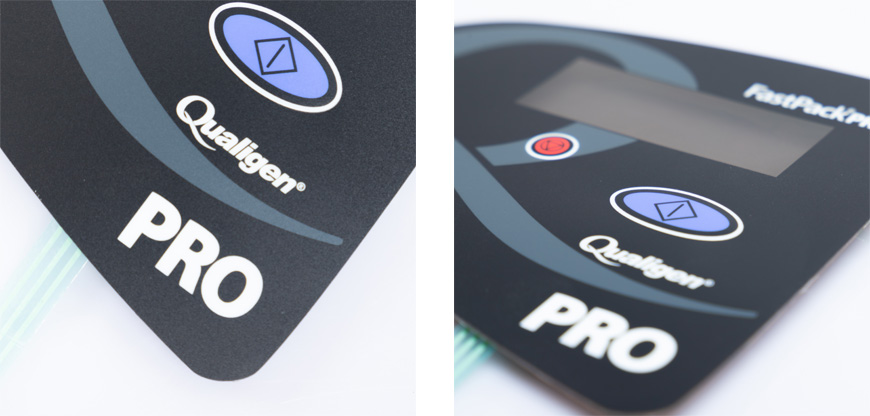
In today's fast-paced technological landscape, large membrane switches have emerged as a crucial interface component in various industries, from medical devices to industrial control systems. These versatile and reliable switches are designed to meet the demands of modern applications where functionality, durability, and user-friendliness are paramount. In this comprehensive guide, we will delve into the world of large membrane switches, exploring their design, applications, advantages, and key considerations.

1. Introduction
Understanding Membrane Switches
2. The Anatomy of a Large Membrane Switch
Layers of a Membrane Switch
Materials Used
3. Design Considerations
Customization Options
Environmental Factors
4. Applications
Medical Equipment
Industrial Control Panels
Consumer Electronics
5. Advantages of Large Membrane Switches
Durability
Cost-Effectiveness
Versatility
6. Installation and Maintenance
Proper Installation Techniques
Maintenance Tips
7. Comparing Membrane Switches with Mechanical Switches
Key Differences
When to Choose Each Type
8. Quality Assurance
Ensuring Longevity
Testing Procedures
9. Innovations in Membrane Switch Technology
Capacitive Membrane Switches
LED Backlit Membrane Switches
10. Case Studies
Real-World Applications
11. Choosing the Right Large Membrane Switch
Factors to Consider
Selecting a Manufacturer
12. Future Trends
Integration with IoT
Enhanced User Experience
13. Conclusion
14. FAQs
What is the lifespan of a large membrane switch?
Can I use a membrane switch in outdoor applications?
Are large membrane switches customizable?
How do membrane switches withstand harsh environments?
What industries benefit the most from large membrane switches?
Understanding Membrane Switches
Membrane switches are thin, flexible, and cost-effective user interfaces that have become integral in modern electronics. They consist of multiple layers, including a graphic overlay, a spacer layer, and a printed circuit. The user presses on the graphic overlay, causing the top and bottom circuit layers to make contact, registering the input. Large membrane switches, as the name suggests, are a larger variant of these interfaces, designed to accommodate applications that require extensive control options.
Layers of a Membrane Switch
A typical large are membrane switch comprises several layers, each serving a specific purpose. The top layer is the graphic overlay, which features printed icons and symbols for user interaction. Below it, there's the spacer layer, which provides the necessary spacing and tactile feedback when the user presses the switch. The bottom layer is the printed circuit, consisting of conductive traces that register the input.
Materials Used
Large membrane switches are crafted from durable materials that can withstand challenging environments. These materials include polyester, polycarbonate, and silicone rubber. The choice of material depends on the specific application requirements, such as resistance to chemicals, UV exposure, or extreme temperatures.
Customization Options
One of the significant advantages of large membrane switches is their customizability. Manufacturers can tailor the design, size, and functionality to meet the unique needs of each application. Whether it's a complex control panel for industrial machinery or a user-friendly interface for medical equipment, customization is key.
Environmental Factors
Large membrane switches can be designed to withstand harsh environments, making them suitable for both indoor and outdoor use. They can resist moisture, chemicals, and temperature extremes, ensuring reliable performance in various conditions.
Medical Equipment
In the healthcare industry, large membrane switches are used in medical devices such as MRI machines, diagnostic equipment, and patient monitoring systems. Their sealed design makes them easy to clean and disinfect, crucial in clinical settings.
Industrial Control Panels
Large membrane switches find widespread use in industrial control panels, where they provide operators with precise control over complex machinery. Their durability and resistance to dust and debris are essential in manufacturing environments.
Consumer Electronics
From home appliances to fitness equipment, consumer electronics benefit from large membrane switches due to their sleek design and responsiveness. They are often found in touchpads, control panels, and gaming devices.
Durability
Large membrane switches are built to last. Their rugged construction and resistance to wear and tear ensure that they can endure heavy usage without compromising performance.
Cost-Effectiveness
Compared to mechanical switches, large membrane switches offer a cost-effective solution for applications that require extensive user interfaces. They are also more affordable to customize, making them a budget-friendly choice for manufacturers.
Versatility
The versatility of large membrane switches is unmatched. They can be adapted for use in diverse industries, from aerospace to automotive, thanks to their flexible design and customizable features.
Proper Installation Techniques
To maximize the lifespan of large membrane switches, proper installation is crucial. Ensuring that the switch is securely mounted, with no tension on the overlay, prevents premature wear and malfunction.
Maintenance Tips
Regular cleaning and maintenance can prolong the life of large membrane switches. It's essential to keep them free from dust and contaminants that can affect their performance.
Key Differences
While both membrane and mechanical switches serve as user interfaces, they have distinct differences. Membrane switches are flat and have no moving parts, while mechanical switches rely on physical key presses. Membrane switches offer a quieter operation and are often more durable.
When to Choose Each Type
The choice between membrane and mechanical switches depends on the specific application requirements. Membrane switches are ideal for applications that require a sleek design, resistance to environmental factors, and customizability. Mechanical switches may be preferred for applications where tactile feedback and a more traditional keyboard feel are necessary.
Ensuring Longevity
Manufacturers of large membrane switches employ rigorous quality control measures to ensure the reliability and longevity of their products. This includes testing for durability, resistance to environmental factors, and electrical performance.
Testing Procedures
Large membrane switches undergo various tests, including actuation testing, UV exposure testing, and chemical resistance testing, to meet industry standards and certifications.
Capacitive Membrane Switches
Capacitive membrane switches have gained popularity for their touch-sensitive capabilities. They detect changes in capacitance when touched, making them suitable for applications requiring multitouch functionality.
LED Backlit Membrane Switches
LED backlighting enhances the visibility of large membrane switches, especially in low-light conditions. This feature is advantageous for applications that require user interaction in dark environments.
To illustrate the versatility of large membrane switches, let's look at two real-world applications:
Aerospace Cockpit Controls: Large membrane switches are used in aircraft cockpit controls for their durability and resistance to extreme temperatures and vibrations.
Medical Cart User Interface: In healthcare settings, large membrane switches are integrated into medical carts, providing nurses and doctors with a user-friendly interface for patient care.
Factors to Consider
When selecting a large membrane switch for your application, consider factors such as size, customizability, environmental conditions, and budget constraints. Working closely with a reputable manufacturer can help you make an informed choice.
Selecting a Manufacturer
Choose a manufacturer with a proven track record in producing high-quality large membrane switches. Look for certifications and testimonials to ensure you're partnering with a reliable supplier.
Integration with IoT
As the Internet of Things (IoT) continues to grow, large membrane switches are expected to play a significant role in connecting devices and enhancing user experiences. They can serve as intuitive control interfaces for smart home appliances and IoT-enabled industrial equipment.
Enhanced User Experience
Manufacturers will focus on improving the user experience by incorporating advanced features such as haptic feedback and voice recognition into large membrane switches.
Large membrane switches have come a long way since their inception, becoming indispensable components in various industries. Their durability, customizability, and cost-effectiveness make them a top choice for applications where user interaction is crucial. As technology evolves, we can expect even more innovative uses and features for these versatile switches.
What is the lifespan of a large membrane switch?
Large membrane switches are designed for long-term use and can typically last for millions of actuations, depending on their quality and environmental conditions.
Can I use a membrane switch in outdoor applications?
Yes, membrane switches can be designed to withstand outdoor conditions, including exposure to moisture, UV radiation, and temperature extremes.
Are large membrane switches customizable?
Absolutely. Large membrane switches can be fully customized in terms of design, size, and functionality to meet the specific requirements of your application.
How do membrane switches withstand harsh environments?
Membrane switches are constructed using durable materials and sealed designs to resist chemicals, dust, moisture, and extreme temperatures, ensuring reliable performance in challenging environments.
What industries benefit the most from large membrane switches?
Large membrane switches find applications in a wide range of industries, including healthcare, industrial automation, aerospace, and consumer electronics, thanks to their versatility and durability.
Large membrane switches are more than just user interfaces; they are enablers of innovation and efficiency in today's interconnected world. Whether you are designing the control panel for a cutting-edge medical device or enhancing the user experience of your consumer electronics, large membrane switches have you covered. Get access to these technological wonders and unlock a world of possibilities.